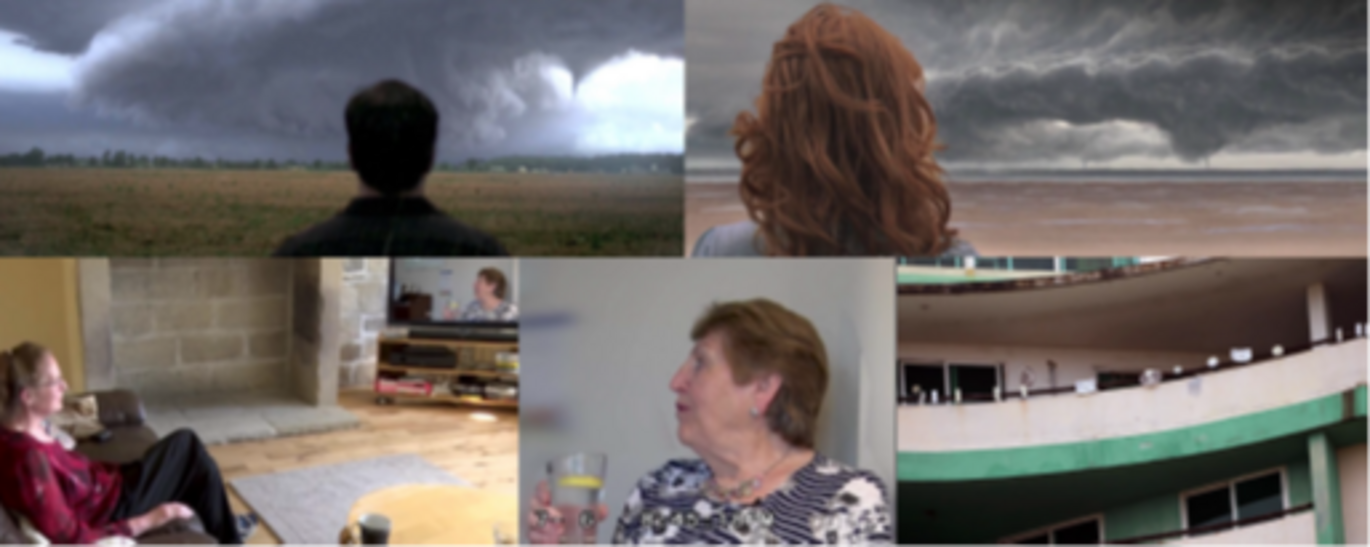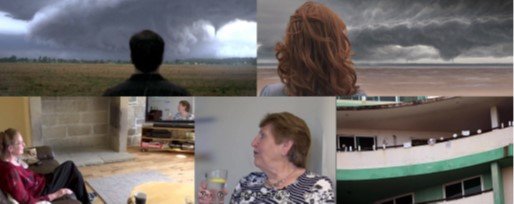Three works in progress by academic filmmakers

Info about event
Time
Location
In Person: Building 1483, Room 656 (floor 6), Nobelparken, Aarhus University. Zoom: Please click Register for meeting link


Part of an ongoing series showcasing work in progress run by the Filmmaking Research, Academic Film and Videographic Criticism research unit.
This hybrid event takes place online and in person.
Register for Zoom here.
In person: Building 1483, Room 656 (floor 6), Nobelparken, Aarhus University.
-
There is a storm coming!
Julia Leyda (Norwegian University of Science and Technology) and Kathleen Loock (Leibniz University Hannover) -
Fragile Connections. Three screen walks about SNET
Steffen Köhn (Dept of Anthropology, Aarhus) -
We’re not making Gone with the Wind
Paul Cooke (Centre for World Cinemas and Digital Cultures, University of Leeds)
Bios and Abstracts:
There is a storm coming!
Our video essay "There is a storm coming!" explores the storm as a metaphor and structuring device in the 2011 film Take Shelter and links it to the U.S. housing crisis, extractivism, and the climate unconscious. As we focus on this rich metaphor, we also try to tease out and engage with the form and aesthetic of Take Shelter, which itself assumes the form of a spiral or cyclone, whirling in circles of increasing intensity and resulting in distress and disorientation. Our video essay lingers on close-up and low-angle shots of protagonist Curtis and juxtaposes them with scenes that show his nightmares and how he wakes up from them. The spiraling structure and the repetition of certain shots and scenes condenses Take Shelter’s form, but also leads us to ever more urgent interpretations of the storm.
Julia Leyda is Professor in Film Studies in the Department of Art and Media Studies at the Norwegian University of Science and Technology (NTNU), Trondheim, where she is a founder of the NTNU Environmental Humanities Research Group. She teaches and conducts research in and across the disciplines including the environmental humanities, intersectional feminist cultural studies, and film/television/media studies. She has written, edited, or co-edited six books, most recently, Reframing Todd Haynes: Feminism’s Indelible Mark (Duke UP, 2022); her next book, Anthroposcreens: Mediating the Climate Unconscious, focuses on contemporary US and Norwegian television and film (Cambridge UP).
Kathleen Loock is Professor of American Studies and Media Studies at Leibniz University Hannover and director of the Emmy Noether Research Group “Hollywood Memories: Cinematic Remaking and the Construction of Global Movie Generations,” funded by the German Research Foundation (DFG). Her research focuses on Hollywood’s remaking practice, seriality, and the role memory and cultural repetition perform on the levels of identity formation and for the maintenance of imagined communities. She has published on remakes, sequels, reboots, and seriality in film and television and written, edited, or co-edited six books and special issues on these topics.
Fragile Connections. Three screen walks about SNET
To compensate for the lack of internet access, Cuban video game enthusiasts and programmers have built vast grassroots computer networks, the biggest of which, SNET (Street Network), at one point connected tens of thousands of households across Havana. This series of screen walk videos is the outcome of a collaboration between an anthropologist, a visual artist (who developed various artistic projects about SNET) and several members of the network’s community. The videos constitute audiovisual explorations of the network from the particular perspectives of a maker of its infrastructure, a user, and two administrators. Aesthetically and conceptually, these videos draw on net-native genres such as tutorial or gameplay videos, or video game walkthroughs.
Steffen Köhn is an anthropologist and filmmaker. He currently is assistant professor of visual and multimodal anthropology at Aarhus University. His research is concerned with the local impacts of digital technologies on citizen-state-relationships, economic arrangements, and social relations.
We’re not making Gone with the Wind
This documentary takes as its starting point an interview that I carried out with my mother, Noreen Cooke, in 2019. Noreen was born in the West of Ireland in 1933 and moved to London permanently in the early 1950s.The interview discusses this part of my mother’s life (up to about the age of 20) and was envisaged as the first of a series of interviews capturing all 86 years of her life. However, she died before we could complete the project. The documentary (currently a work in progress) puts this interview into dialogue with my sister Belinda, and seeks to explore Belinda’s relationship with Noreen and how she has dealt with losing her mother.
Paul Cooke is Centenary Chair of World Cinemas at the University of Leeds. In recent years his work has focussed on a series of participatory filmmaking projects working with young people in Germany, South Africa, Cambodia, Colombia and Lebanon. These have generally involved Paul training young people make films about the legacy of the past and its impact on their lives today. This has involved helping young people to make films about the Stasi past in Germany, the legacy of the Khmer Rouge in Cambodia and the continuing impact of apartheid in South Africa. The present film is a very new direction for Paul and is a far more personal project that his other work.
Contact: Filmmaking Research, Academic Film and Videographic Criticism
